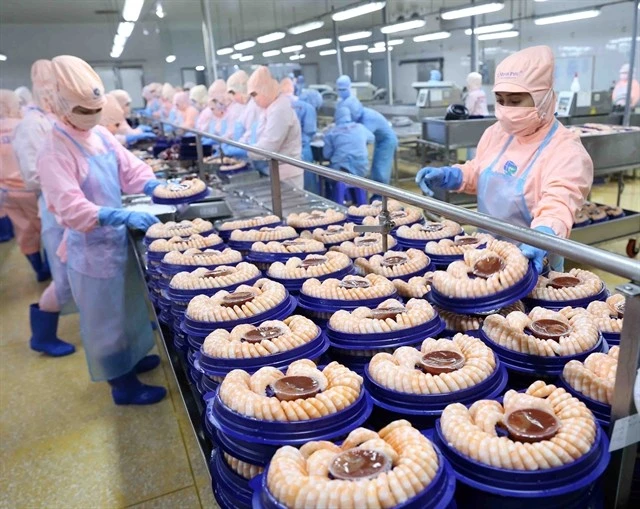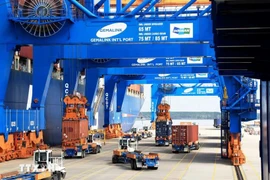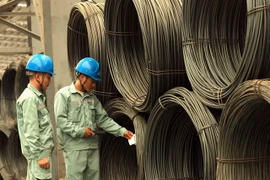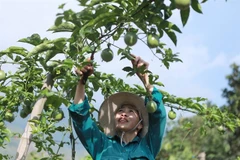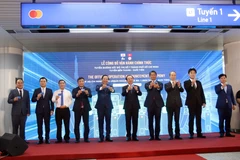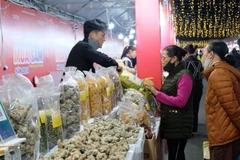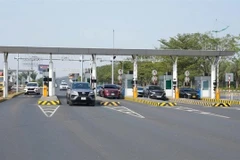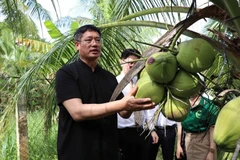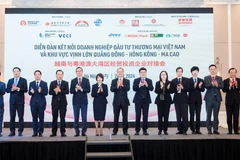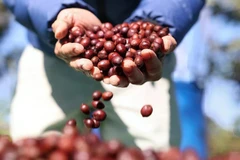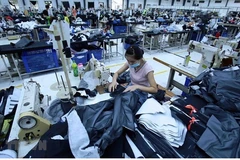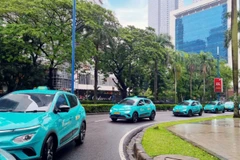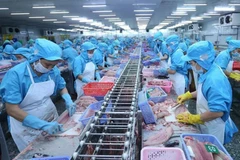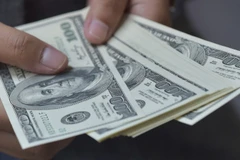Hanoi (VNS/VNA) - Experts believe that Vietnamese enterprises need to develop green products for export to the UK, contributing to increasing exports to this market.
On May 1, 2021, the UK-Vietnam Free Trade Agreement (UKVFTA) officially took effect. After more than three years of implementing the UKVFTA, the total bilateral trade value has grown by an average of 8.9% each year.
Vietnam's exports to the UK have grown by an average of 9.4% each year. This growth rate is much higher than the overall growth rate of Vietnam's exports, according to Nguyen Son Tra from the Multilateral Trade Policy Department under the Ministry of Industry and Trade.
The advantages from the commitments at this FTA have helped promote further the trade between the two countries, turning the UK into the third largest export market of Vietnam in Europe, after the Netherlands and Germany.
However, as a new generation FTA, the UKVFTA sets out many rules related to sustainable development.
In addition to the UKVFTA, the UK Government has also issued series of measures and policies on further promoting trade and sustainable development for goods made in the UK as well as imported from other countries to this market.
These greatly affect the export of goods to the UK. For example, for seafood exported to this market, the UK not only cares about the quality of the seafood, but also the origin of the goods.
With such regulations, Vietnamese enterprises have to pay much more attention to making appropriate adjustments in the production process to meet the requirements of the UK, Tra said.
The trend of sustainable consumption is increasingly, and the Government, businesses and consumers in the UK consider this issue as vital requirement.
Nguyen Canh Cuong, former trade counsellor of Vietnam in the UK, said that the UK is one of the markets with the highest standards in the terms of food safety and plant quarantine. It is also one of the pioneering countries in combating climate change.
Furthermore, the UK market has a large number of high-income consumers who is willing to pay more for green and organic products.
Products such as organic food, sustainable fashion and recycled packaging, are increasingly preferred over traditional products, although the prices of those products are often higher.
According to Cuong, this is a very important factor that Vietnamese businesses need to pay attention to when exporting to the UK. The UK market requires products to meet strict standards on food safety, plant quarantine and especially regulations against climate change.
Although many enterprises have difficulties when facing the requirements on green standards and clean production technology, the pioneering enterprises will help other businesses develop together, he said.
The pioneering enterprises in applying green technology can increase the value of their products, helping Vietnamese products attract attention from more UK businesses and consumers.
The production costs may increase, but selling prices also can be up to 20% higher than the average price. This proves that sustainable development can bring high profits and help enterprises maintain competitiveness in the long term.
Along with that, the former trade counsellor in the UK pointed out three important notes for Vietnamese businesses when entering the UK market. First, building a green brand is an indispensable factor to access this market. Having international certificates for green products will help increase competitiveness.
Second, the enterprises need to invest in green technology because it is a mandatory trend now, although this is a big challenge.
Finally, enterprises must grasp British consumer tastes, adjusting their product marketing strategies. Especially, they need to provide transparent and clear information about the products on online platforms for partners and British consumers.
Dr Le Huy Huan, Coordinator of the Green Growth and Global Climate Change Programme in Vietnam (CCG Vietnam), said that more than 70 countries have incorporated green standards into their trade activities. The UK is one of the pioneers in building and promoting the implementation of green trade policies.
When enterprises' products meet the sustainable standards, they will have the opportunity to expand their export markets worldwide. If businesses cannot adapt, they will lose their position in the global supply chain and thus lose their competitive advantage, he said.
However, Huan noted that compliance costs are a huge problem because all transformations take time and money. Meanwhile, Vietnam has more than 80% of small and medium enterprises, so it is really difficult for them in the initial investment to apply greener and cleaner technology for processes, and to have qualified human resources.
According to Huan, developed countries have more opportunities to carry out these standards. Meanwhile, developing or underdeveloped countries such as African countries or Vietnam are really difficult to follow these high standards.
Support policies
Huan said large enterprises in Vietnam have been very proactive in adapting to changes in green trade policies as well as building production processes to meet global standards, like Vinasamex and Minh Phu Group in the fishery industry.
Meanwhile, small and medium sized enterprises face challenges in the term of finance to achieve standards or to make their entire production chain transparent.
The State needs to develop supportive policies for businesses carrying out a sustainable development model, such as loans with low interest rates and more loans for investing in machinery and technology systems or a model controlling quality standards and traceability, said Nguyen Thi Huyen, CEO of Vietnam Cinnamon and Star Anise Export JSC (Vinasamex) which is a cinnamon and star anise supplier of many famous brands in the UK.
The enterprises also want the authorities to have supportive tools for them during digital transformation to ensure transparency and competitiveness, Huyen said.
Vietnam has had many policies on promoting green transformation, such as the green growth strategy for the 2021-30 period. This strategy has very specific goals relating to reduction of carbon emissions, and sustainable production and consumption.
It has also been building a carbon market and regulations on trading carbon credits in this market.
In addition, the Ministry of Industry and Trade, the Ministry of Natural Resources and Environment and VCCI have organised many seminars, talks, and short-term and long-term training programmes for enterprises to help them raise awareness of the green development and green trade trends in the world. They also help the enterprises respond to those changes, implement technology transformation, as well as make transparent supply chains.
However, Huyen said, the Government should promote communication on green development, organic standards, and organic products, so the enterprises are ready to convert from a traditional model to a green model. Thereby, Vietnam will have more enterprises to carry out green development, but not just few ones at present.
At the same time, it needs to have policies for businesses to easily access to the loans with low interest rates.
To effectively utilise advantages at FTAs, the Ministry of Industry and Trade has implemented a series of supportive measures for the enterprises to implement green trade and sustainable development, said Tra.
The Ministry of Industry and Trade has built an ecosystem model for each industry. For example, it has set up an ecosystem for the cinnamon industry to support businesses in participating deeply in the regional and global supply chains, and promoting the exports./.
